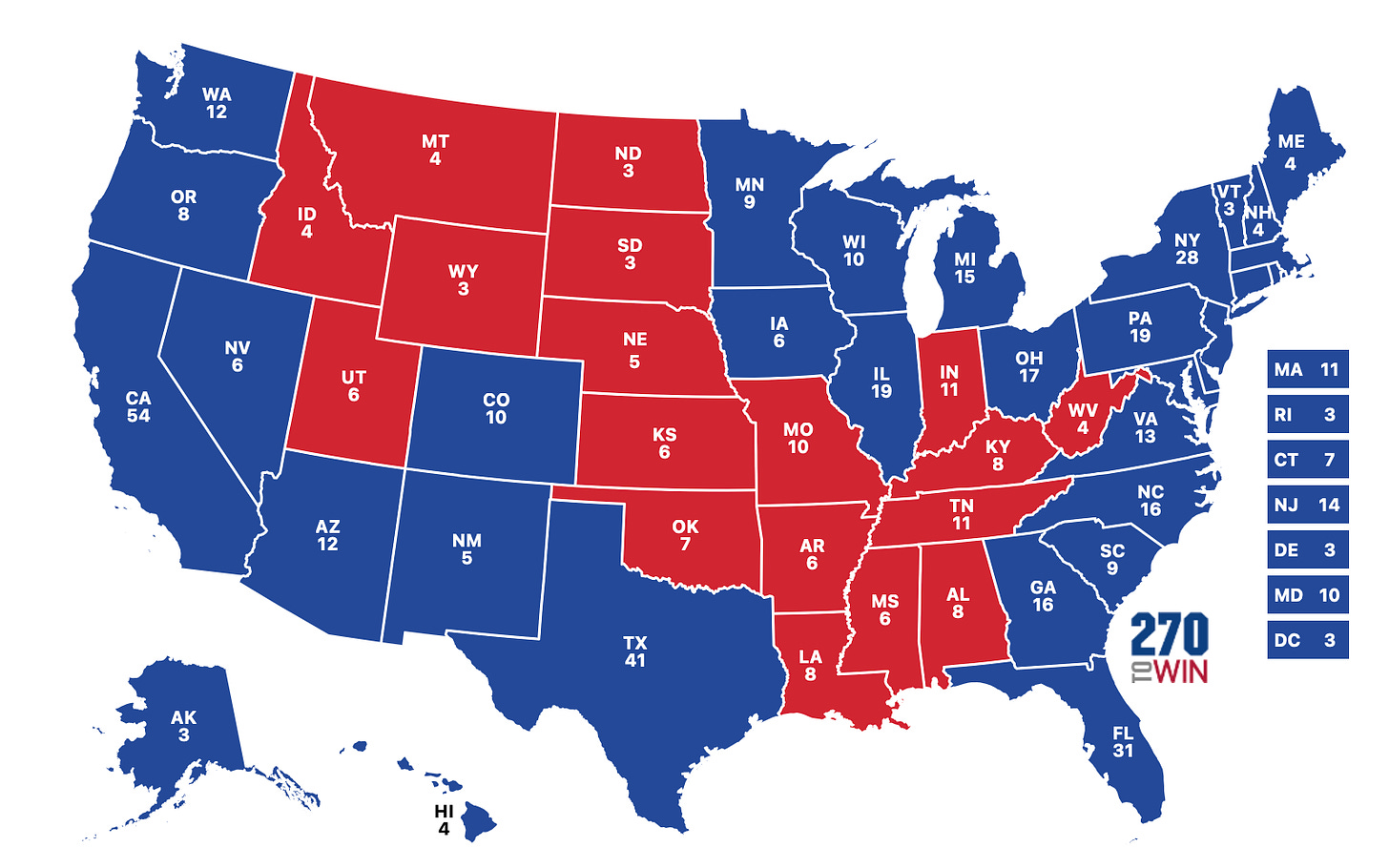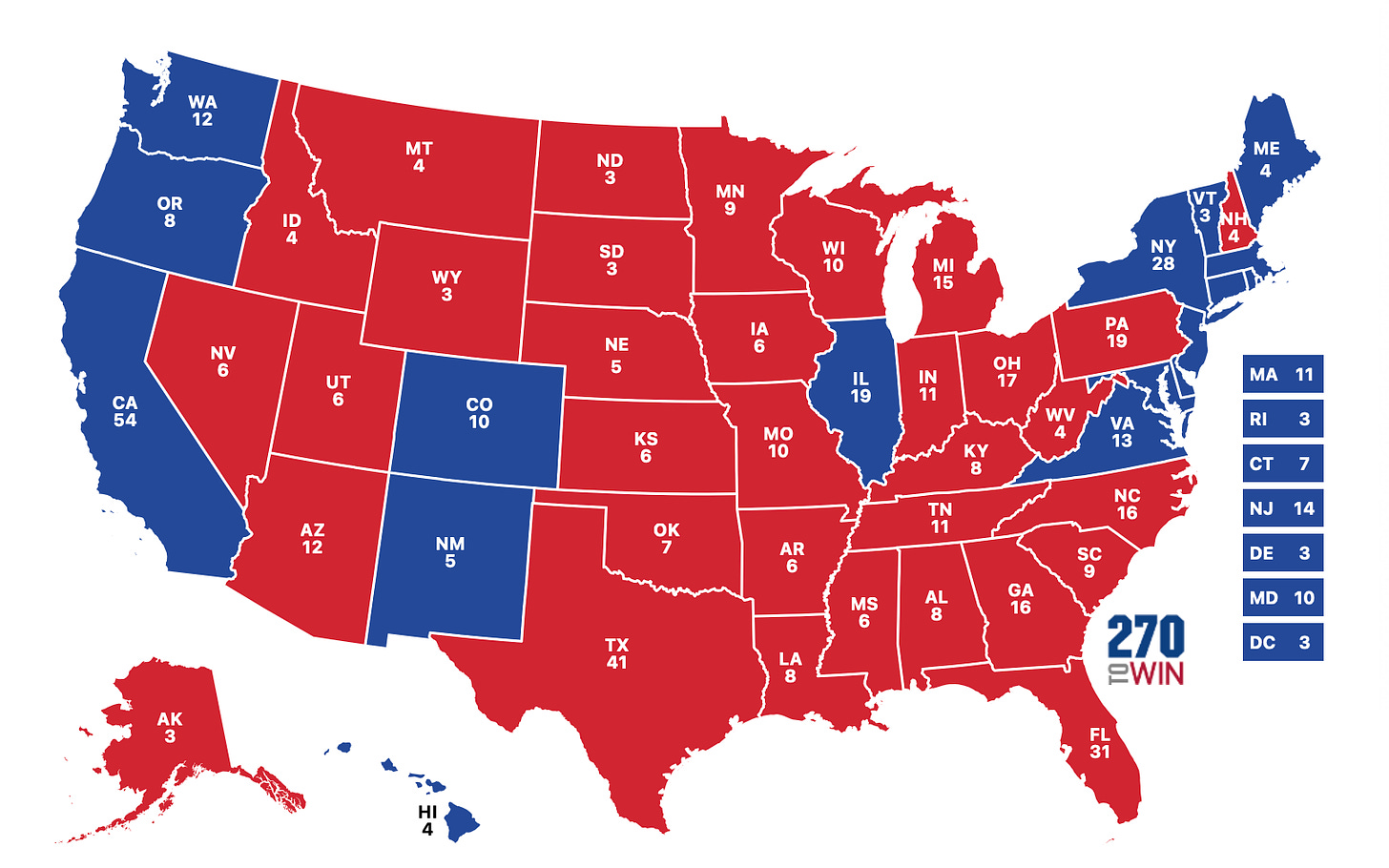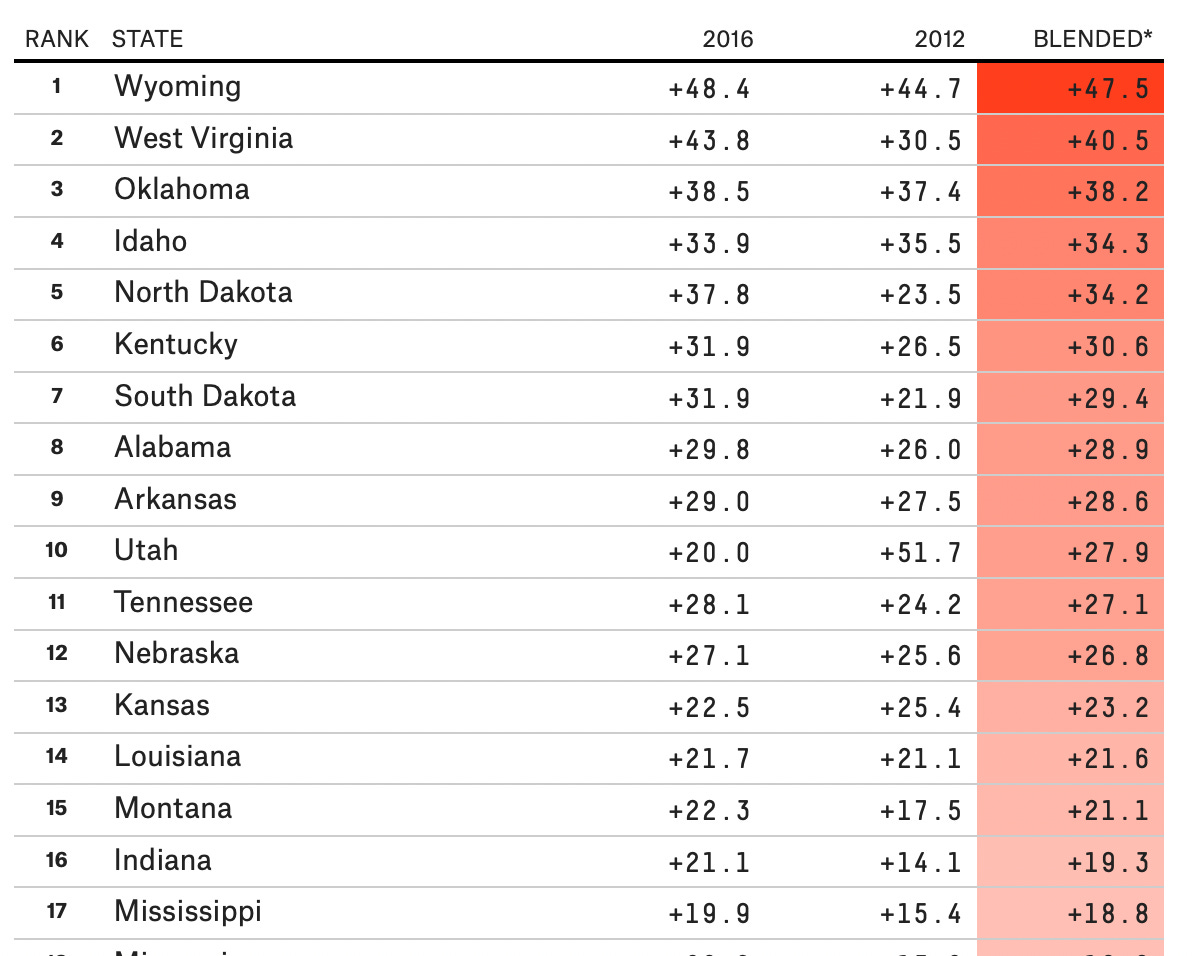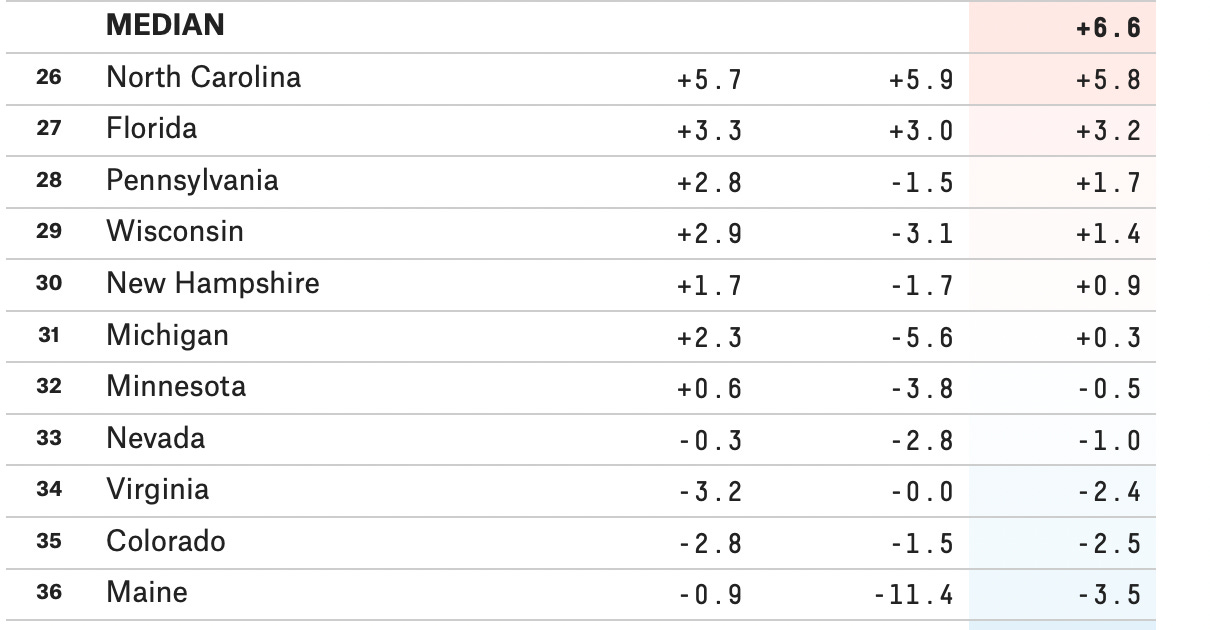Three lessons from Donald Trump's second, closer acquittal 📊 February 14, 2021
On parties, opinion leaders, and malapportionment
Dear reader,
On Saturday, the US Senate acquitted former president Donald Trump on charges that he incited an insurrection against the government. This was anticipated well ahead of time. But the 57-43 vote — including 10 Republicans — in favor of conviction nevertheless teaches us several valuable lessons about the state of democracy, the parties, and public opinion.
Below, I have commented on these lessons, summarized the work I did last week, and offered a look at the week ahead. There are a few articles I hope you’ll check out.
Be well,
—Elliott
Thanks as ever for reading my weekly data-driven newsletter on politics, polling, and democracy. As always, I invite you to drop me a line (or just respond to this email) with any thoughts worth sharing. Please click/tap the ❤️ under the headline if you like what you’re reading; it’s our little trick to sway Substack’s curation algorithm in our favor. If you want more content, I publish subscribers-only posts once or twice a week.
Three lessons from Donald Trump's second, closer acquittal
On parties, opinion leaders, and malapportionment
On January 6th, 2021, the president told his supporters to “go down” to the US Capitol and “fight like hell” to prevent Republicans, including the Vice President, from “stealing” the election from him and his loyal patriots. At the same rally, his personal lawyer declared there should be a “trial by combat” between Republicans and Democrats to decide the outcome of the election. Hours later, the crowd had broken into the US Capitol and violently halted the presidential transition of power.
It is worth stating the series of events clearly to reckon with a big question: If the events had taken place fifty years ago, would the conduct have been more or less impeachable? Why?
I suspect that the answer is yes. To me, this is the first lesson from Senate’s impeachment vote.
1. Factionalism has broken another key lever of Constitutional power
Alexander Hamilton screeds in Federalist No. 65 that political parties pose a unique danger to the functions of the Senate in regard to the “judicial character of the Senate,” where reason and deliberation ought to prevail over groupthink and a lust for power. In a particularly prescient passage, he writes that
The prosecution of them, for this reason, will seldom fail to agitate the passions of the whole community, and to divide it into parties more or less friendly or inimical to the accused. In many cases it will connect itself with the pre-existing factions, and will enlist all their animosities, partialities, influence, and interest on one s de or on the other; and in such cases there will always be the greatest danger that the decision will be regulated more by the comparative strength of parties, than by the real demonstrations of innocence or guilt.
The delicacy and magnitude of a trust which so deeply concerns the political reputation and existence of every man engaged in the administration of public affairs, speak for themselves. The difficulty of placing it rightly, in a government resting entirely on the basis of periodical elections, will as readily be perceived, when it is considered that the most conspicuous characters in it will, from that circumstance, be too often the leaders or the tools of the most cunning or the most numerous faction, and on this account, can hardly be expected to possess the requisite neutrality towards those whose conduct may be the subject of scrutiny.
He practically could have been writing about the events of the last few months. A political party, whose base was overwhelmingly opposed to Trump being convicted in the Senate, where they have a 50-50 split with their opposition, voted overwhelmingly to reject the House’s charges of impeachable conduct.
As I mentioned, it is hard to imagine that such conduct would have been acceptable 50 years ago. Take Richard Nixon’s actions with Watergate as our prime and most relevant example. Then, both political parties decided that the president’s conduct was so impeachable that they pressured him behind-the-scenes to resign or face certain removal.
All of this is different now. The calculations for co-partisan Senators are made easier both by political polarization — which has made voting against their leaders harder — and by the watchful eyes of the media, which could amplify their disloyalty to the voters.
This brings me to the second big thing we can learn:
2. For Republicans, the party no longer decides
I wrote about this a bit last week, but the entire impeachment episode has illustrated how strong Trump’s sway over the part still is, despite him holding any formal power over them. Perhaps some of them imagined that the Senate would not impeach him, and therefore he could run again in 4 years and punish them then. But that could easily have been solved via coordination.
There are two likelier explanations. First, there is the leader-vs-follower dichotomy. Scholars of public opinion and political leadership have long argued that democratization and increasing emphasis on the desires of the people via public opinion polls would shrink representatives’ capacity and desire for leading opinion rather than following it. Well, the vast majority of Republicans — 90%, per YouGov’s polling — wanted Trump to be acquitted. If they believe themselves to simply be delegates for their primary supporters, GOP officials had no choice but to acquit.
But the road goes two ways. The second explanation is that most Republican leaders simply like Trump and/or actually think he would have been wronged by a conviction. Imagine this scenario: After debating their decision internally, they came to the conclusion that they should oppose it. Signaling their desire to acquit to other leaders and the public, they increased opposition to the impeachment among GOP voters. Then, ever seeking a public mandate for their actions, they pointed to the polling they had just shaped as evidence for their predetermined actions.
Underscoring all of this is those seven Republican Senators who voted to convict, and the 10 House members who voted to impeach. People like Liz Cheney, Adam Kinzinger, Ben Sasse, Mitt Romney, Richard Burr, Susan Collins, and Pat Toomey all hold a good amount of influence in the party. They hold positions of power or are sought out by reporters to comment on stories. They have a lot of money or lobbyist allies to direct toward campaigning. They are also more moderate, and are recruited for big legislative pushes by the democrats; often, on Capitol Hill, what they say goes.
We would typically refer to these people as the institutional wing of the party — ones who pull levers and get things done. Yet in the case of impeachment, “the party” did not decide. Instead, the 43 other Republican Senators voted against impeachment, bowing to the influence of the former president and the more extreme wing of the party. Again, see Federalist No. 65 above.
3. What to expect when you’re expecting a conviction
Public opinion polls indicated that a majority of voters wanted a conviction — about 56%, per the last polling I saw. Of course, it’s hard to translate into an ideal point-prediction of how many Senators should have voted in favor. In a purely proportional system, we might think that 56% of Senators should have. 57 did — that’s not far off.
But when we talk about policy and preferences, voters usually don’t care about the way the votes are cast. They want to see action and consequence; preferable outputs and outcomes. If your model to predict Senate votes shifts from a proportional one, with a linear curve, to some sort of preferential model with more of a sigmoid function, then we’d expect even more Senators to vote yes.
Third, there’s a flipped-state model, where both the senators from each state vote for something if a majority of voters in the state favor it. In this scenario, based on a quick uniform swing of the election results from Biden +4 to Biden +12 (eg from 52% of the two-party vote to 56%), we would have expected 64 Senators to vote in favor of impeachment, assuming all Biden voters all impeachment supporters. (Again, this is for the sake of thought, I doubt this would match reality.)
But how do Democrats get to 67? That is, after all, the Congressional threshold for convicting a president on charges of impeachment. How high does public opinion need to be then?
Well, let’s attempt to solve the problem backward. We know that the US Senate currently gives the Republicans about a 6-point popular vote advantage. In other words, in a national election for the chamber, Democrats would need to win by 6 percentage points to win a 50-50 split of seats, all else being equal (which of course it’s not, but play along for the sake of the exercise). So, based on an average of the above rules for Senators’ votes, we’d expect conviction to clear the 67 vote threshold sometime around 60% of people being in favor (67% + 55% + 57%, per the functions, / 3).
Okay, I’ve probably lost a few people there. I kinda lost myself. Here’s the point: We ought to ask ourselves two questions. First, how democratic is this? And, second, can we reasonably expect that any presidents will act in deference to this sort of sanction? If becoming impeached is just another typical trick of Constitutional hardball, but nobody ever gets convicted, what is there to fear?
Back to the question on democracy. Let’s do the opposite exercise: How do we get Republicans to 67 votes, using the state-majority function? All it takes is this map, where red/blue indicate majority levels of support, presumably through some series of polls or MRP projection:
This is the map you get in an R+3 presidential election. For comparison, Democrats need a D+14 contest to win the 67 votes per the majority formula. (And it would probably be even harder in real life, since Senators don’t come 0/1 from each state for every vote.) These numbers also depend on the year; Here’s another calculation using numbers from 2012 and 2016, rather than 2020: If you swing Senate results until Democrats win the 16th state (representing their 67th Senator) in order of Republican presidential margin, they need to win nationally by 19 points to convict a GOP president:
To win their 67th seat and convict a Democratic president, in contrast, Republicans would only need to win the equivalent popular vote by around two points, the presidential lean of the 34th state, Virginia.
There are a number of ways to slice this, but none of them make the Senate look especially well-apportioned. Especially in regards to supermajority requirements for impeachment, this does not sound like a system that’s working very well. For all you fans of The Office out there, impeachment is not an accountability booster, it’s a doomsday device.
Posts for subscribers
February 12: The Democrats could go even big(ger) on their economic stimulus. One experiment found the price tag of the bill has no impact on public opinion
February 11: Think big: political reform must be cultural and sociological, not just institutional. America has deep-rooted societal and cultural problems that often get passed over for “easier” institutional reforms
February 9: Support for convicting Trump is higher now than during his first impeachment. The Senate is likely to acquit him anyway
What I'm Reading and Working On
Last week for The Economist I wrote two articles: one on the extraordinarily high levels of polarization in Donald Trump’s approval ratings, and another on the registration data showing a bunch of Republicans leaving the party. I think that most takes on the latter are pretty overhyped. You’ll have to subscribe to our free US politics newsletter to read that article, though.
Next week, I’m writing about GOP moves to restrict voting access, and maybe something about the culture war or extremism. I haven’t decided yet.
On the book front: I have one chapter left! I can’t wait to get drafts of it out to all of you who have volunteered to read it. I also can’t wait for this to be over, and for it to be on shelves; it has been a rewarding experience but I’m incredibly impatient when it comes to projects getting made public! I’m a millennial, after all — we do not dabble in delayed gratification!
Other links and recommendations:
Perry Bacon Jr, FiveThirtyEight: “In America's ‘uncivil war,’ Republicans, particularly GOP state-level officials, are increasingly the side taking the most hostile and undemocratic actions against their perceived enemies.”
Frances Lee, Monkey Cage blog: “Democrats underperformed their expectations in 2020. That’s not surprising, considering where the country is.”
Geoffrey Skelley, FiveThirtyEight: “Why A Trump-Led Third Party Is Unlikely”
Thanks for reading!
Thanks for reading. I’ll be back in your inbox next Sunday. In the meantime, follow me online or reach out via email if you’d like to engage. I’d love to hear from you. If you want more content, I publish subscribers-only posts once or twice each week.








The difference between supermajority thresholds for the Republicans and Democrats is truly shocking. It's unnerving to think what today's GOP would do with 60+ votes in the Senate. An all-out electoral reform seems like the only, unlikely way out to even the odds for both parties.
Hi Elliott,
If Trump did what he did during the Nixon and Watergate era, he would almost certainly been convicted (he wouldn't have resigned).
There are two lessons that I see from both of Trump's acquittals.
1. Impeachment does not work. Congress will not hold the President accountable under any circumstance. I don't think 2/3 of the Senate will vote to convict a President. A future President will ignore Congress and the counts and claim vast executive power.
2. Impeachment may be used for partisan purposes instead of for real conduct issues. Senator Lindsey Graham suggested that Vice President Kamala Harris will get impeached if the Republicans regain control of the House. I'm not sure why Harris would be impeached. I think Graham is worried that impeaching President Joe Biden will backfire, so Harris becomes the person Republicans want to impeach. Graham's reasoning suggests that the Republicans would impeach Harris because she is a Black/Asian woman.
https://twitter.com/atrupar/status/1360963559820320773
Ultimately, I'm concerned about checks and balances failing and the growing power of the Presidency.
-Elliot